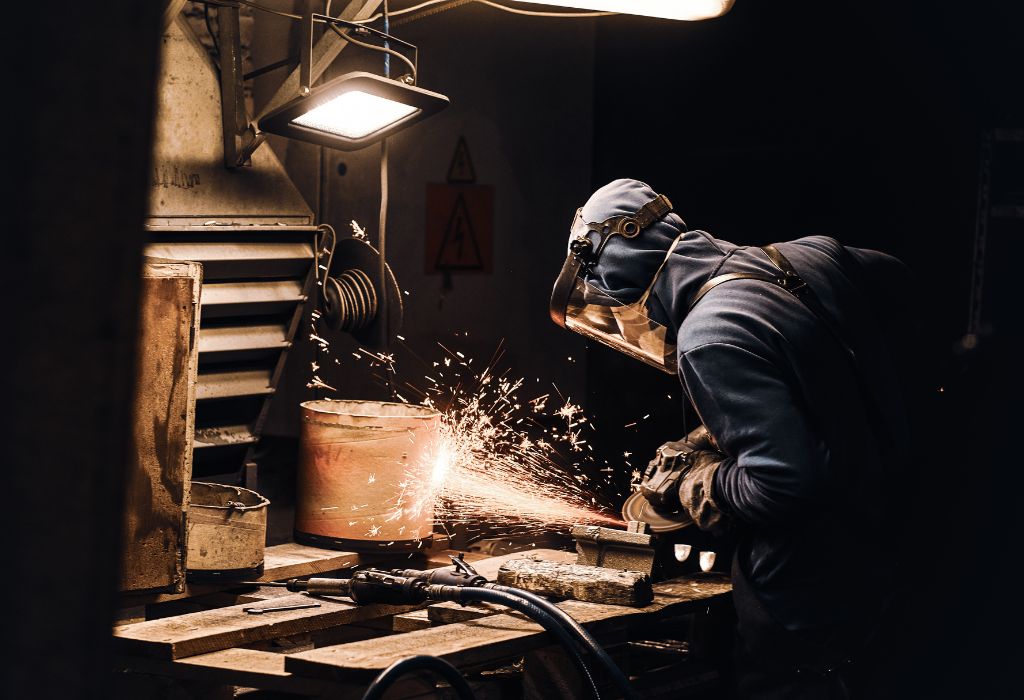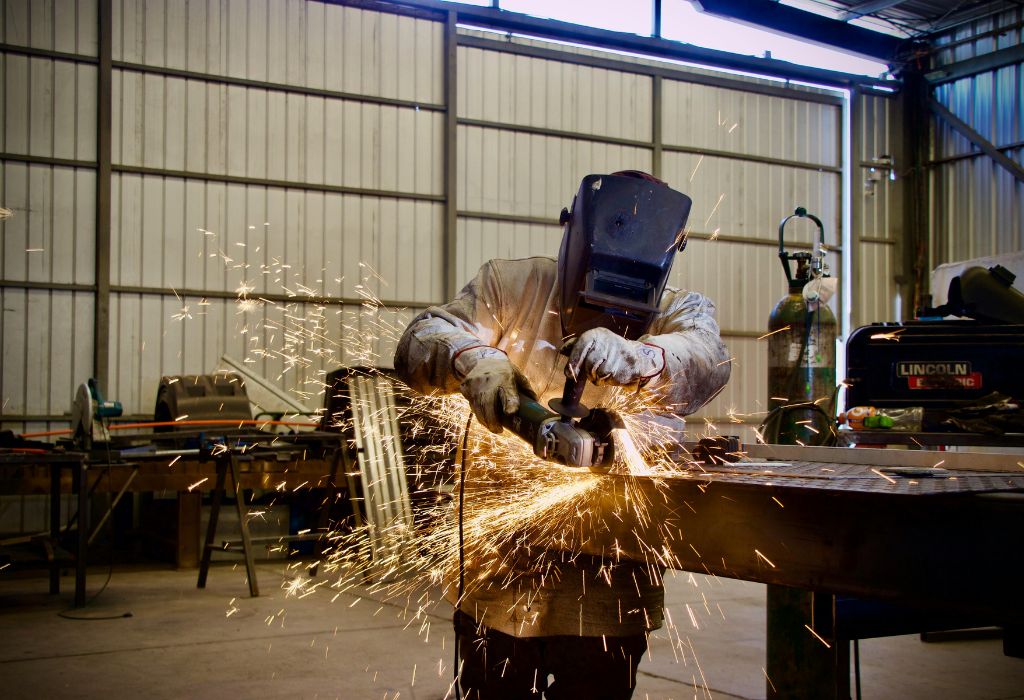A young welder steps into a nuclear power facility for the first time, the air thick with both tension and opportunity.
Every bead of weld here is more than metal—it is about safety, precision, and the security of an entire community relying on clean energy.
In such an environment, the question naturally arises: how much does a nuclear welder make for carrying such responsibility?
The curiosity is valid because nuclear welding stands apart from most other welding jobs. It demands exceptional skill, specialized certifications, and unwavering attention to safety.
Unlike common welding tasks in construction or manufacturing, nuclear welders work in highly regulated settings where precision can determine the lifespan of a reactor component.
With such responsibility, salaries often reflect both the risks and the rare expertise required.
Statistics reveal just how valuable these roles can be. According to Glassdoor, the average nuclear welder salary in the United States is about $93,000 per year (Glassdoor).
Salary.com further highlights hourly wages averaging $26, with top earners pushing past $30 per hour (Salary.com).
These figures make nuclear welding one of the most lucrative specialties in the field.
For welders considering this path, the potential is undeniable. Yet, beyond salary numbers lie critical factors such as location, certifications, and career progression that can dramatically influence earnings. Exploring these details offers valuable insights into whether pursuing nuclear welding is worth the rigorous training and responsibility it demands.
What Is a Nuclear Welder?
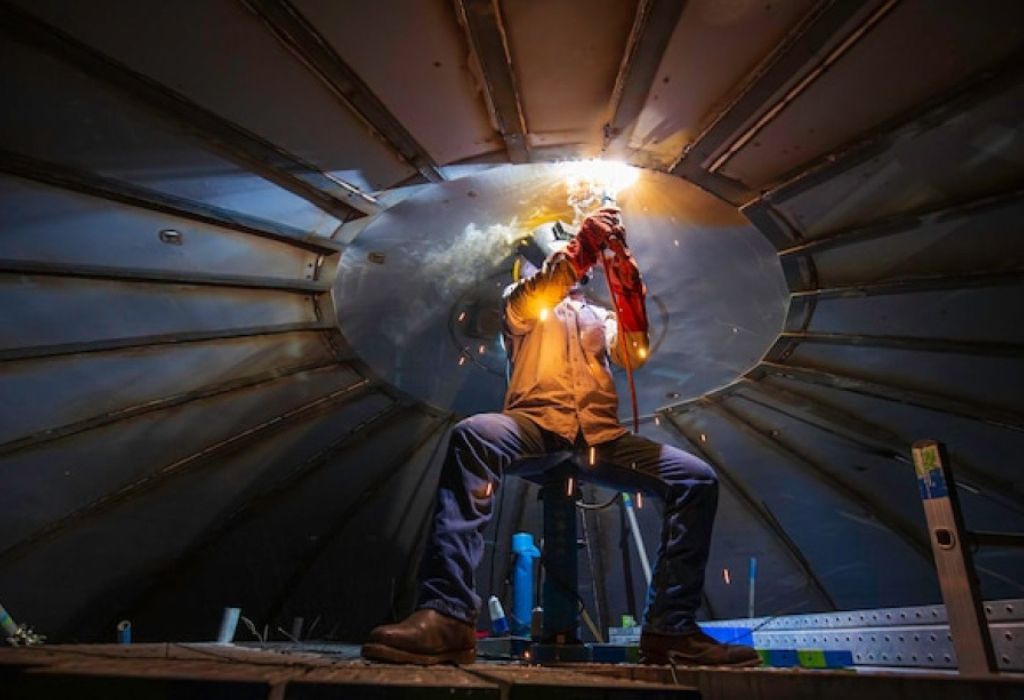
A nuclear welder is a highly specialized professional who performs welding tasks inside nuclear power plants, research facilities, or naval reactors. Their work involves joining, repairing, and fabricating metal components that must withstand extreme pressure, heat, and radiation over long lifespans.
Unlike standard welding roles in construction or manufacturing, nuclear welders operate under rigorous safety and regulatory frameworks. Every weld is inspected to the highest standards because even the smallest flaw could compromise the integrity of a critical system.
This career path often requires advanced training, certifications, and continuous testing to ensure compliance with codes such as ASME Section IX and the AWS standards. Because of the specialized environment, nuclear welders are considered among the most technically skilled professionals in the welding industry.
What does a nuclear welder do?
A nuclear welder fabricates and repairs components used in nuclear reactors and related systems under strict safety codes.
How is nuclear welding different from general welding?
It requires extreme precision, adherence to nuclear quality codes, and the ability to work in controlled or hazardous environments.
Which industries hire nuclear welders?
Nuclear energy, defense, naval shipbuilding, and maintenance contractors.
What certifications are required for nuclear welders?
Common certifications include ASME Section IX, AWS D1.1, and nuclear-specific quality assurance approvals.
Is nuclear welding considered high-risk?
Yes, because welders may face radiation exposure, confined spaces, and heightened safety requirements.
How Much Does a Nuclear Welder Make?
Salary figures vary depending on location, employer, and level of expertise. Most reports suggest nuclear welders earn significantly more than general welders due to the sensitive nature of their work.
Glassdoor lists the average salary at $93,000 annually, with ranges spanning $70,000–$120,000+ depending on experience (Glassdoor). Salary.com estimates an average hourly wage of $26, with a range of $23–$30 (Salary.com). Indeed reports that welders at Consolidated Nuclear Security average $39 per hour (Indeed).
These figures demonstrate that nuclear welding offers stable, high-paying opportunities, especially when compared to average welding salaries, which often hover between $40,000–$60,000 annually.
What is the average annual salary for nuclear welders?
Around $90,000–100,000, with potential to exceed $120,000.
How much do nuclear welders make per hour?
Typically $23–$30, though experienced welders may earn more.
Do overtime and bonuses add to pay?
Yes, overtime can boost income by 15–25%, and bonuses are common in nuclear contracts.
Are nuclear welders always full-time employees?
Most work full-time, but some are contract-based with premium pay.
How does this compare to average welders?
Nuclear welders earn roughly 40–60% more than general welders.
Factors That Influence Nuclear Welder Salary
While base pay is high, multiple factors impact total earnings. Location often determines wage levels, as nuclear hubs like California, New York, or Washington may offer premium salaries. Experience, certifications, and employer type also play critical roles.
Union membership is another significant factor. Unionized welders often enjoy higher wages, structured overtime, and better benefits compared with non-union workers. Shift differentials for night or weekend work can also boost income considerably.
Q&A: Salary Influencers
Does location affect nuclear welder pay?
Yes, regions with nuclear plants or higher living costs often pay more.
Do certifications increase salary potential?
Absolutely—specialized certifications are often tied to higher rates.
Is union membership common among nuclear welders?
Yes, and union contracts often result in stronger pay and benefits.
Does experience matter for earnings?
Yes, senior welders may command $40+ per hour.
Do shift differentials significantly raise income?
Yes, second or third shifts can add 10–20% more per hour.
Nuclear Welder vs Other Welding Specializations
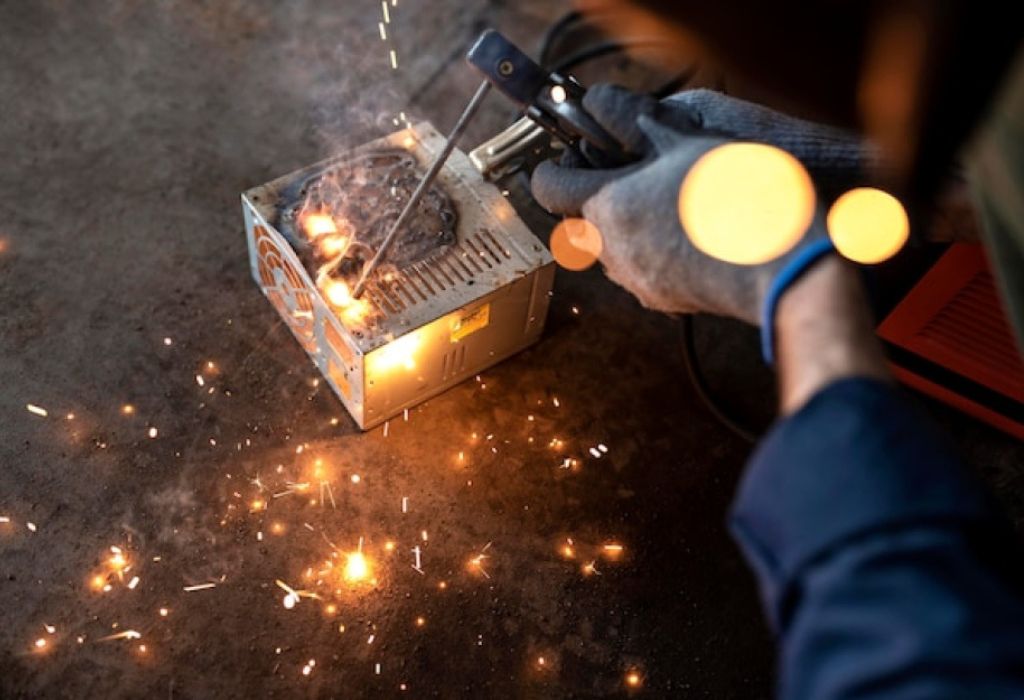
Comparing nuclear welders with other specialized welders highlights the value of this niche. Pipeline welders and underwater welders may sometimes earn similar or higher wages, but nuclear welding offers greater stability.
For example, underwater welders can make $100,000+ annually, but face extreme risks. Pipeline welders often earn $70,000–$110,000, depending on travel and overtime. Welding engineers and inspectors may earn even more, but these roles often involve management or technical oversight rather than hands-on welding.
Do underwater welders earn more than nuclear welders?
In some cases, yes, but risk and instability are higher.
How does pipeline welding compare?
Pipeline welders earn slightly less base pay but may earn more with overtime.
Is nuclear welding safer than underwater welding?
Yes, though it still involves strict safety protocols.
Which roles earn more than nuclear welders?
Welding engineers and inspectors often exceed nuclear welder salaries.
Why choose nuclear welding over other paths?
It balances high pay with stability and long-term demand.
Career Path and Advancement
Nuclear welding is not just about immediate income—it also offers opportunities for advancement. Entry-level welders may start at $60,000–80,000, but experienced professionals can surpass $120,000 with seniority.
Career progression often leads to supervisory positions, welding inspection roles, or transitions into welding engineering. Some welders move into teaching or consulting, leveraging their expertise in nuclear codes and safety standards.
What is the entry-level pay for nuclear welders?
Typically $60,000–80,000 per year.
How much do senior nuclear welders earn?
Experienced welders can earn $120,000+ annually.
What advancement opportunities exist?
Supervision, inspection, and engineering roles.
Do nuclear welders transition to other careers?
Yes, many become inspectors, trainers, or engineers.
Is demand expected to grow?
Yes, due to nuclear plant maintenance and new builds.
Tips to Maximize Income as a Nuclear Welder
Maximizing income requires both skill and strategy. Pursuing advanced certifications such as ASME Section IX or AWS standards is one of the most effective ways. Relocating to high-paying regions or joining a union can also significantly boost income.
Specializing in high-value techniques such as orbital welding or radiographic testing often results in higher hourly rates. Many welders also take advantage of overtime and shift work to increase earnings.
Which certifications increase pay the most?
ASME Section IX and nuclear-specific welding approvals.
Do specialized techniques pay more?
Yes, orbital and radiographic welding skills often command premiums.
Is relocation worth it for higher pay?
Yes, moving to nuclear hubs can raise salaries by 15–30%.
Does overtime meaningfully impact income?
Yes, overtime can add thousands annually.
Is union membership financially beneficial?
Yes, unions often secure better base pay and benefits.
Real-World Salary Examples
Examining real-world figures adds clarity. In Canada, nuclear welding roles often list hourly wages of C$33.94–$41.33 (Glassdoor Canada). In the U.S., Consolidated Nuclear Security reports average wages near $39/hr (Indeed).
These salaries illustrate how geography and employer size influence pay. They also show that nuclear welders consistently earn well above the general welding average.
How much do nuclear welders earn in Canada?
Between C$33–41 per hour.
What is pay at major U.S. nuclear contractors?
About $39/hr, with overtime potential.
Do bonuses and hazard pay apply?
Yes, many roles include additional pay incentives.
Are nuclear welders paid more than average welders?
Yes, typically 40–60% higher.
Can overtime double income in some cases?
Not double, but overtime can add 20–30% annually.
Challenges in Nuclear Welding
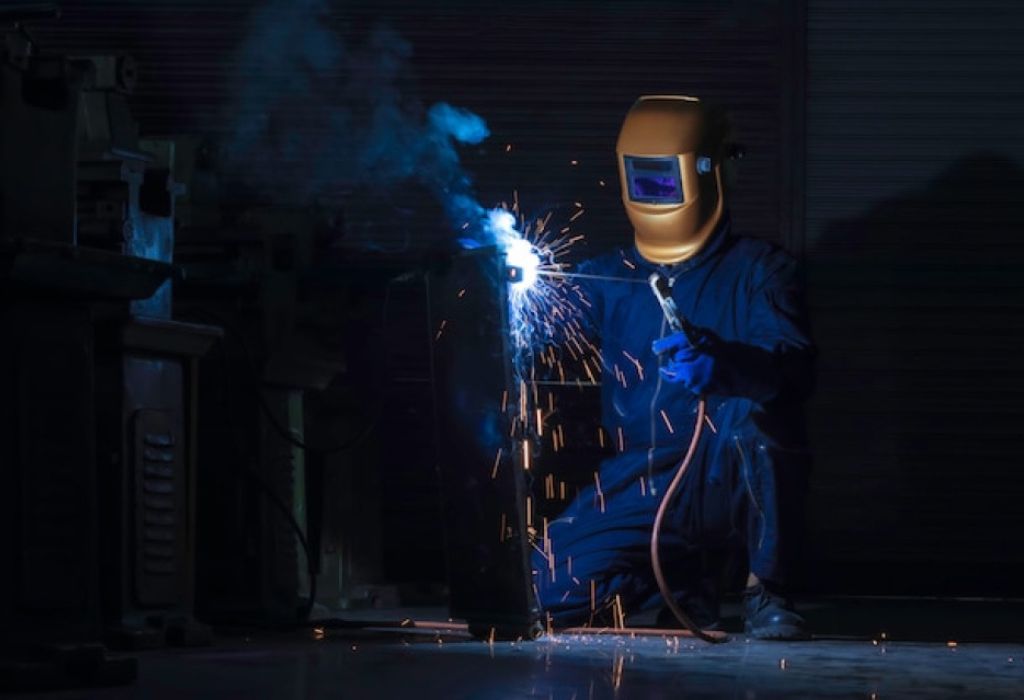
High salaries come with significant challenges. Welders face strict inspection requirements, intense training, and high safety risks. They may work in confined spaces, deal with radiation protocols, or require security clearances.
The mental and physical strain can be high, but many welders see the rewards as worth the challenges.
What safety risks exist in nuclear welding?
Radiation, confined spaces, and high heat.
Is job entry difficult?
Yes, due to certifications and background checks.
Do nuclear welders need clearances?
Often, especially in defense-related roles.
Is the job physically demanding?
Yes, requiring endurance and precision.
Can automation replace nuclear welders?
Automation is growing, but critical welds still need human skill.
Future Outlook for Nuclear Welders
The outlook for nuclear welders remains promising. Aging reactors require constant maintenance, while newer projects like small modular reactors create new opportunities.
Global pushes for clean energy may expand the nuclear sector, ensuring consistent demand for skilled welders.
Is nuclear welding demand growing?
Yes, especially in plant maintenance and upgrades.
How do small modular reactors affect demand?
They create new opportunities for specialized welders.
Will regulation influence pay?
Stricter safety codes often raise pay due to increased demand.
Are nuclear welders globally in demand?
Yes, especially in the U.S., Canada, and Europe.
How can welders future-proof careers?
By pursuing advanced training and adapting to new reactor technology.
Conclusion
So, how much does a nuclear welder make? The answer is clear: nuclear welders often earn $90,000–120,000 annually, far above industry averages. Hourly rates range from $23–30, with overtime, bonuses, and certifications pushing earnings even higher.
While the path requires dedication, training, and strict adherence to safety, the rewards are significant. For welders seeking both financial security and professional respect, nuclear welding remains one of the most lucrative and stable career choices.
For anyone considering this path, the next step is to explore certification opportunities, research nuclear employers, and prepare for a career where every weld carries extraordinary responsibility and value.

I’m Darrell Julian, the founder, lead writer, and hands-on welding enthusiast behind ArcWeldingPro.com. With more than 15 years of real-world welding experience, I created this platform to share what I’ve learned in the field, in the shop, and in the heat of the arc.

